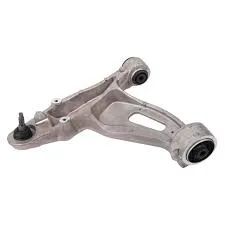2 月 . 06, 2025 04:25
Back to list
lower control arm price
Navigating the world of automotive repairs can be overwhelming, especially when it comes to understanding specific components like the lower control arm. This crucial part of the suspension system plays an integral role in maintaining stability and comfort in your vehicle. Whether you're a seasoned mechanic or a car enthusiast looking to maintain your own vehicle, understanding the pricing dynamics of lower control arms can save you time, money, and ensure the safety of your ride.
Labor costs should be factored into the total expenditure as well. Replacing a lower control arm is a labor-intensive task that can require a few hours to complete, with labor rates fluctuating between $50 to $150 per hour depending on the region and the expertise of the mechanic. Opting for a professional installation ensures that the component is fitted correctly and safely, which is crucial for maintaining optimal vehicle performance and safety. While cost is a significant consideration, quality should never be compromised. A lower-priced inferior product could lead to further damage not only to the suspension system but also to other integral parts of the vehicle, thereby increasing long-term expenses. Investing in quality from the outset is a strategy that pays dividends in terms of both reliability and safety. Before purchasing, it's advisable to consult with automotive experts or community forums dedicated to the specific make and model of your vehicle. These platforms are rich with insights and firsthand testimonials, providing invaluable guidance on which brands and materials offer the best value for price. Trustworthiness is crucial in this decision-making process. Rely on verified reviews and seek recommendations from those with direct experience. Establishing a relationship with a trusted mechanic or automotive expert can also provide assurance and clarity, transforming what can be a daunting process into a straightforward one. By considering these factors with a keen eye, you can navigate the complexities of buying a lower control arm with confidence. After all, when it comes to vehicle maintenance, informed decisions not only safeguard your investment but ensure your safety and peace of mind on the road.


Labor costs should be factored into the total expenditure as well. Replacing a lower control arm is a labor-intensive task that can require a few hours to complete, with labor rates fluctuating between $50 to $150 per hour depending on the region and the expertise of the mechanic. Opting for a professional installation ensures that the component is fitted correctly and safely, which is crucial for maintaining optimal vehicle performance and safety. While cost is a significant consideration, quality should never be compromised. A lower-priced inferior product could lead to further damage not only to the suspension system but also to other integral parts of the vehicle, thereby increasing long-term expenses. Investing in quality from the outset is a strategy that pays dividends in terms of both reliability and safety. Before purchasing, it's advisable to consult with automotive experts or community forums dedicated to the specific make and model of your vehicle. These platforms are rich with insights and firsthand testimonials, providing invaluable guidance on which brands and materials offer the best value for price. Trustworthiness is crucial in this decision-making process. Rely on verified reviews and seek recommendations from those with direct experience. Establishing a relationship with a trusted mechanic or automotive expert can also provide assurance and clarity, transforming what can be a daunting process into a straightforward one. By considering these factors with a keen eye, you can navigate the complexities of buying a lower control arm with confidence. After all, when it comes to vehicle maintenance, informed decisions not only safeguard your investment but ensure your safety and peace of mind on the road.
Latest news
Upgrade Your Vehicle with Quality Control Arms
NewsNov.01,2024
Unlock Superior Performance with Our Control Arms for Sale
NewsNov.01,2024
Unlock Optimal Vehicle Performance with Diverse Control Arm Types
NewsNov.01,2024
Transform Your Ride with Lower Control Arm Replacement
NewsNov.01,2024
Revolutionize Your Ride with Control Arm Mounts
NewsNov.01,2024
Elevate Your Vehicle with Premium Control Arms
NewsNov.01,2024









